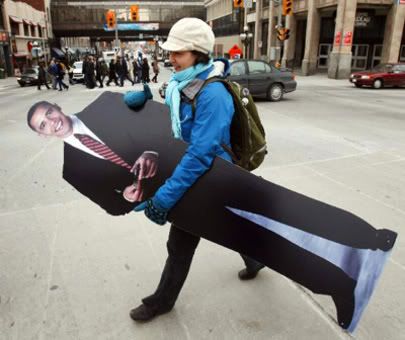I have always had the greatest respect for Nat Hentoff.
Nat Hentoff has had a life well spent, one chock full of controversy fueled by his passion for the protection of civil liberties and human rights. Hentoff is known as a civil libertarian, free speech activist, anti-death penalty advocate, pro-lifer and not uncommon critic of the ideological left. At 84, Nat Hentoff is an American classic who has never shied away from an issue. For example, he defended a woman rejected from law school because she was Caucasian; called into a talk show hosted by Oliver North to agree with him on liberal intolerance for free speech; was a friend to the late Malcolm X; and wrote the liner notes for Bob Dylan's second album.
A self-described uncategorizable libertarian, Hentoff adds he is also a “Jewish atheist, civil libertarian, pro-lifer.” Accordingly, he has angered nearly every political faction and remains one of a few who has stuck to his principles through his many years of work, regardless of the trouble it stirred up. For instance, when he announced his opposition to abortion he alienated numerous colleagues, and his outspoken denunciation of President Bill Clinton only increased his isolation in liberal circles (He said that Clinton had "done more harm to the Constitution than any president in American history," and called him "a serial violator of our liberties.").
Born in Boston on June 10, 1925, Hentoff received a B.A. with honors from Northeastern University and did graduate work at Harvard. From 1953 to 1957, he was associate editor of Down Beat magazine. He has written many books on jazz, biographies and novels, including children's books. His articles have appeared in the Wall Street Journal, New York Times, Commonwealth, the New Republic, the Atlantic and the New Yorker, where he was a staff writer for more than 25 years. In 1980, he was awarded a Guggenheim Fellowship in Education and an American Bar Association Silver Gavel Award for his coverage of the law and criminal justice in his columns. In 1985, he was awarded an Honorary Doctorate of Laws by Northeastern University. For 50 years, Hentoff wrote a weekly column for the Village Voice. But that publication announced that he had been terminated on December 31, 2008. In February 2009, Hentoff joined the Cato Institute as a Senior Fellow.
[snip]
John W. Whitehead: When Barack Obama was a U.S. Senator in 2005, he introduced a bill to limit the Patriot Act. Now that he is president, he has endorsed the Patriot Act as is. What do you think happened with Obama?
Nat Hentoff: I try to avoid hyperbole, but I think Obama is possibly the most dangerous and destructive president we have ever had. An example is ObamaCare, which is now embattled in the Senate. If that goes through the way Obama wants, we will have something very much like the British system. If the American people have their health care paid for by the government, depending on their age and their condition, they will be subject to a health commission just like in England which will decide if their lives are worth living much longer.
In terms of the Patriot Act, and all the other things he has pledged he would do, such as transparency in government, Obama has reneged on his promises. He pledged to end torture, but he has continued the CIA renditions where you kidnap people and send them to another country to be interrogated. Why is Obama doing that if he doesn't want torture anymore? Throughout Obama's career, he promised to limit the state secrets doctrine which the Bush-Cheney administration had abused enormously. The Bush administration would go into court on any kind of a case that they thought might embarrass them and would argue that it was a state secret and the case should not be continued. Obama is doing the same thing, even though he promised not to.
So in answer to your question, I am beginning to think that this guy is a phony. Obama seems to have no firm principles that I can discern that he will adhere to. His only principle is his own aggrandizement. This is a very dangerous mindset for a president to have.
JW: Do you consider Obama to be worse than George W. Bush?
NH: Oh, much worse. Bush essentially came in with very little qualifications for presidency, not only in terms of his background but he lacked a certain amount of curiosity, and he depended entirely too much on people like Rumsfeld, Cheney and others. Bush was led astray and we were led astray. However, I never thought that Bush himself was, in any sense, "evil." I am hesitant to say this about Obama. Obama is a bad man in terms of the Constitution. The irony is that Obama was a law professor at the University of Chicago. He would, most of all, know that what he is doing weakens the Constitution.
In fact, we have never had more invasions of privacy than we have now. The Fourth Amendment is on life support and the chief agent of that is the National Security Agency. The NSA has the capacity to keep track of everything we do on the phone and on the internet. Obama has done nothing about that. In fact, he has perpetuated it. He has absolutely no judicial supervision of all of this. So all in all, Obama is a disaster.
JW: Obama is not reversing the Bush policies as he promised. But even in light of this, many on the Left are very, very quiet about Obama. Why is that?
NH: I am an atheist, although I very much admire and have been influenced by many traditionally religious people. I say this because the Left has taken what passes for their principles as an absolute religion. They don't think anymore. They just react. When they have somebody like Obama whom they put into office, they believed in the religious sense and, of course, that is a large part of the reason for their silence on these issues. They are very hesitant to criticize Obama, but that is beginning to change. Even on the cable network MSNBC, some of the strongest proponents of Obama are now beginning to question, if I may use their words, their "deity."
JW: Is the so-called health commission that you referred to earlier what some people are referring to as death panels? Is that too strong a word?
NH: That term was used with hyperbole about the parts of the health care bill where doctors are mandated, if people are on Medicare and of a certain age or in serious physical condition, to counsel them on their end-of-life alternatives. I don't believe that was a death panel. It was done to get the Medicare doctors to not spend too much money on them. The death panel issue arose with Tom Daschle, who was originally going to be the Health Czar. Daschle became enamored with the British system and wrote a book about health care, which influenced President Obama.
In England, you have what I would call government-imposed euthanasia. Under the British healthcare system, there is a commission that decides whether or not, based on your age and physical condition, the government should continue to pay for your health. That leads to the government not doing it and you gradually or suddenly die. The present Stimulus Bill sets up the equivalent commission in the United States similar to that which is in England. The tipoff was months ago on the ABC network. President Obama was given a full hour to describe and endorse his health plan. A woman in the audience asked Obama about her mother. Her mother was, I believe, 101 years old and was in need of a certain kind of procedure. Her doctor didn't want to do it because of her age. However, another doctor did and told this woman there is a joy of life in this person. The woman asked President Obama how he would deal with this sort of thing, and Obama said we cannot consider the joy of life in this situation. He said I would advise her to take a pain killer. That is the essence of the President of the United States.
JW: Do you think Obama is shallow?
NH: It's much worse than that. Obama has little, if any, principles except to aggrandize and make himself more and more important. You see that in his foreign policy. Obama lacks a backbone—both a constitutional backbone and a personal backbone. This is a man who is causing us and will cause us a great deal of harm constitutionally and personally. I say personally because I am 84 years old, and this is the first administration that has scared me in terms of my lifespan.
JW: But he is praised for his charisma and great smile. He can make people believe things just by his personality.
NH: That was a positive factor in his election. A good many people voted for Obama, and I'm not only talking about the black vote. A lot of people voted for Obama because of our history of racial discrimination in this country. They felt good even though they didn't really know much about him and may have had some doubts. But at least they showed the world we could elect a black president. And that is still part of what he is riding on. Except that, too, is diminishing. In the recent Virginia election, the black vote diminished. Now why was that? I think a lot of black folks are wondering what this guy is really going to do, not only for them but for the country. If the country is injured, they will be injured. That may be sinking in.
JW: One of the highest unemployment rates in the country is among African-Americans.
NH: Not only that, the general unemployment rate is going to continue for a long time and for all of us. I have never heard so many heart-wrenching stories of all kinds of people all across the economic spectrum. As usual, the people who are poorest—the blacks, Hispanics and disabled people—are going to suffer more than anyone else under the Obama administration. This is a dishonest administration, because it is becoming clear that the unemployment statistics of the Obama administration are not believable. I can't think of a single area where Obama is not destructive.
JW: A lot of people we represent and I talk to feel that their government does not hear them, that their representatives do not listen to them anymore. As a result, you have these Tea Party protests which the Left has criticized. What do you think of the Tea Party protests?
NH: I spent a lot of time studying our Founders and people like Samuel Adams and the original Tea Party. What Adams and the Sons of Liberty did in Boston was spread the word about the abuses of the British. They had Committees of Correspondence that got the word out to the colonies. We need Committees of Correspondence now, and we are getting them. That is what is happening with the Tea Parties. I wrote a column called "The Second American Revolution" about the fact that people are acting for themselves as it happened with the Sons of Liberty which spread throughout the colonies. That was a very important awakening in this country. A lot of people in the adult population have a very limited idea as to why they are Americans, why we have a First Amendment or a Bill of Rights.
JW: Less than 3% of high school students can pass the immigration test while over 90% of people from foreign countries can pass it. The questions are simple—such as, "What is the supreme law of the land?" or "Who wrote the Declaration of Independence?" Civic education in the United States is basically dead.
NH: I have been in schools around the country, and I have written on education for years. Once, I was once doing a profile on Justice William Brennan and I was in his chambers, and Brennan asked, "How do we get the words of the Bill of Rights into the lives of the students?" Well, it is not difficult. You tell them stories. When I speak to students, I tell them why we have a First Amendment. I tell them about the Committees of Correspondence. I tell them how in a secret meeting of the Raleigh Tavern in Virginia, Thomas Jefferson and Patrick Henry, who did not agree with each other, started a Committee of Correspondence.
Young people get very excited when they hear why they are Americans. It is not hard to do. We hear talk now about reforming public education. There are billions of dollars at stake for such a reform. But I have not heard Arne Duncan, who is the U.S. Education Secretary, mention once the civic illiteracy in the country.
JW: Adults are constitutionally illiterate as well.
NH: A few years ago, I was lecturing at the Columbia Journalism School of Education. I asked them about what was happening to the Fourth Amendment. I said, "By the way, do you know what is in the Fourth Amendment?" One student responded, "Is that the right to bear arms?" It's hard to believe these are bright students.
[snip]





















